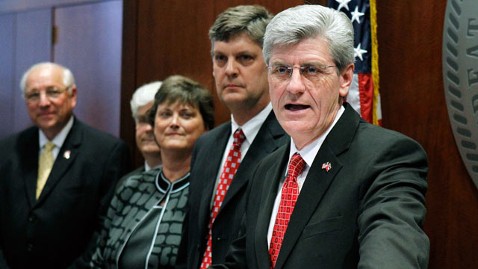Mississippi Ends Decades-Old Mansion Trustie Program

Rogelio V. Solis/AP Photo
Mississippi's new governor has abolished a decades-old practice that involves inmates working at the governor's mansion. The program sparked national debate after former Gov. Haley Barbour decided to pardon four trusties convicted of murder in early January, along with some 200 other people.
Gov. Phil Bryant's office said that state prison trusties stopped working at the governor's residence as of Thursday.
"As governor, Bryant first discontinued the practice of inmates spending the night on the mansion grounds and then the tradition of pardoning those individuals," spokesman Mick Bullock said in a statement. "Lastly, Governor Bryant stated that he would work towards phasing out the use of trusties at the mansion and that last phase of Bryant's plan was completed Thursday."
The Republican governor has said this issue is particularly close to his heart because his aunt was kidnapped, raped and murdered in 1981. Her murderer received, and is currently serving a life sentence.
Earlier this month, Barbour pardoned five trusties who worked at the mansion throughout his two terms in office. Four of them were convicted murderers.
The tradition of having inmates work at the governor's resident is unique to the South and has deeply religious roots. Barbour has repeatedly tied the move to the state's Christian heritage and said its customary for the governor to pardon trusties.
"For decades, Mississippi governors have granted clemency to the inmates who work at the mansion," he wrote in a Washington Post op-ed Wednesday. "I followed that tradition four years ago and did so again at the end of my second term. No one should have been surprised."
Adding that the trusties working at the mansion "are not threats to society" and "have paid the price for their crimes," Barbour defended his move as a continuation of the "tradition of gubernatorial clemency for the mansion inmates."
"In Mississippi, the constitutional power of pardon is based on our Christian belief in repentance, forgiveness and redemption - a second chance for those who are rehabilitated and who redeem themselves," he wrote. "Other great religions have similar tenets; so does the U.S. Constitution."
"For some who are rehabilitated and redeem themselves, the governor is the only person who can give them a second chance. I am very comfortable giving such people that opportunity," he added.
In 2008, Barbour faced similar backlash for releasing trusty Michael David Graham, who served 19 years of his life sentence for killing his ex-wife. Graham walked free after working eight years in the governor's mansion.
But Bryant made it clear at the onset of his term that the practice, tradition or not, wouldn't continue under him. The six new trusties who have been working in the mansion since Jan. 3 will be reassigned, The Clarion-Ledger reported.
Mississippi was one of the last states where the program was still thriving. South Carolina ended its trusty program in 2001, after inmates were found to be having sex in the governor's residence. North Carolina has a similar program that uses inmates for upkeep of a part of the governor's residence.